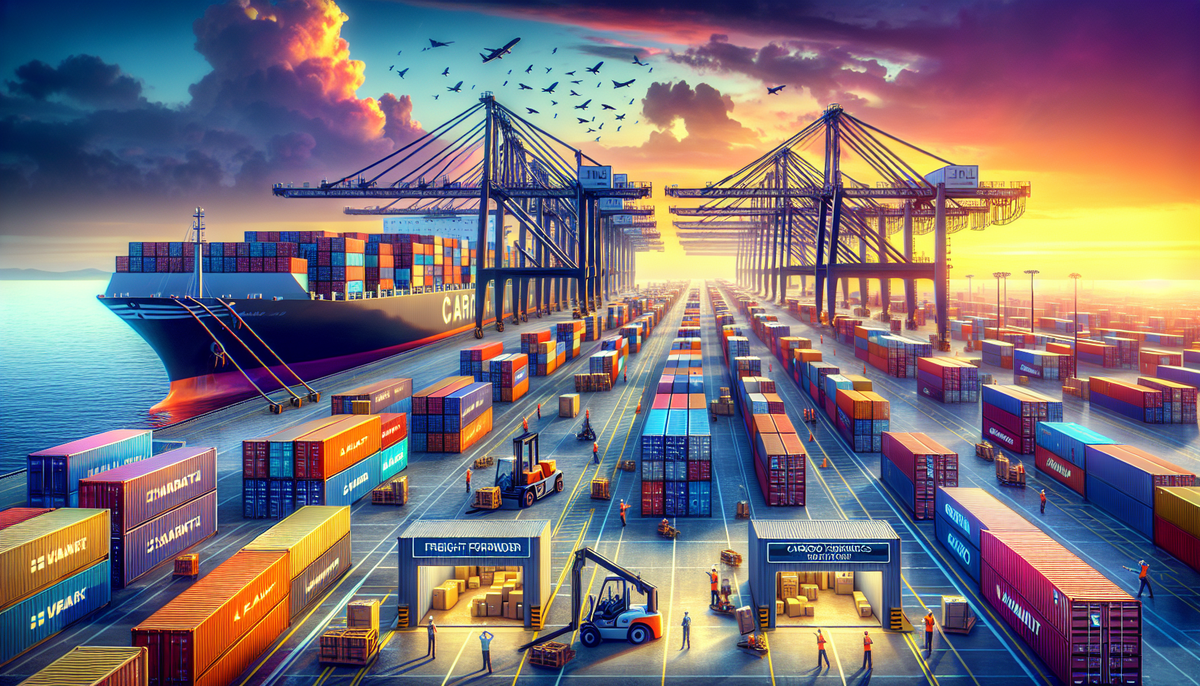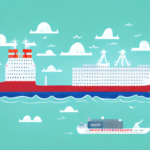Understanding the Benefits of Full Container Load (FCL) Shipping
If you're looking to transport large quantities of goods across long distances, full container load (FCL) shipping is an excellent option. By choosing to ship your goods in a full container, you can leverage a wide range of benefits that are challenging to achieve with other forms of transport. In this article, we'll delve deeper into FCL shipping, discussing its advantages, costs, and impact on global trade.
The Advantages of FCL Shipping for Businesses
For businesses that need to move substantial amounts of products, FCL shipping is a reliable and cost-effective transportation method. The primary advantage of FCL shipping is the exclusive use of the container, meaning your goods are not mixed with those of other shippers. This exclusivity results in reduced risk and enhanced security for your goods. Additionally, FCL shipping offers flexibility in loading and unloading, minimizing the potential for damage.
Another significant advantage of FCL shipping is the greater control it provides over the shipping process. Businesses can select the most efficient routes and schedules for their shipments, ensuring timely delivery and reducing the risk of delays. This level of control also allows for better planning and budgeting, as shipping costs and delivery times can be accurately predicted.
FCL shipping also enables businesses to consolidate their shipments. By filling a container with multiple products, businesses can take advantage of economies of scale and reduce overall shipping costs. This is particularly beneficial for companies that regularly ship large quantities of goods, allowing them to save on shipping and pass those savings on to their customers.
How FCL Shipping Can Save You Money and Time
FCL shipping can save both time and money compared to other shipping methods. Since FCL shipping is exclusive, it is typically faster as there is no need to wait for the container to be filled with other shipments. Additionally, FCL shipping provides significant cost savings over less-than-container-load (LCL) shipping, as you only pay for the container space you use, not a portion of someone else's container.
Beyond time and cost savings, FCL shipping offers greater security for your goods. With your shipment being the sole occupant of the container, there is a reduced risk of damage or theft compared to LCL shipping, where goods are combined with other shipments.
Furthermore, FCL shipping allows for more flexibility in the type and quantity of goods you can ship. Unlike LCL shipping, which may limit you based on available space in a shared container, FCL shipping grants you the entire container to yourself, enabling efficient packing to maximize space and minimize costs.
FCL vs LCL: Which Shipping Method is Right for You?
When deciding between FCL and LCL shipping, it's crucial to consider the size and volume of your shipment. FCL shipping is best suited for larger shipments that can fill an entire container, while LCL shipping is ideal for smaller shipments that cannot fill a whole container and need to be consolidated with other shipments. To determine the best method for your needs, assess the size of your shipment and how quickly you require delivery.
Cost is another critical factor in choosing between FCL and LCL shipping. FCL shipping tends to be more cost-effective for larger shipments, as the cost per unit decreases with increased volume. However, for smaller shipments, LCL shipping may be more economical since you only pay for the space you utilize in the container. It's essential to balance the cost against the urgency of your shipment and the level of security you need.
Maximizing Space in FCL Shipping
To maximize space in an FCL shipment, accurately measure the dimensions and weight of your goods. Efficient packaging and loading are essential to ensure no unused space remains. Proper packaging can also mitigate the risk of damage during transport.
Consider using interlocking or stackable packaging to optimize space usage, allowing items to be stacked without wasting space. Additionally, using pallets or crates can help maximize space and protect your goods during transit.
Tips for Securing Your Goods During FCL Shipping
Securing your goods during FCL shipping involves careful packing and proper stowage within the container. Use sturdy packing materials and ensure fragile items are clearly labeled and adequately protected to reduce damage risks. Consider using dunnage—materials placed between cargo during transport—to provide additional protection and prevent movement within the container.
Ensuring the container is properly sealed and locked is crucial to prevent unauthorized access, reducing the risk of theft or damage to your cargo. Additionally, partnering with a reputable shipping company with a proven track record of safe and secure transport is highly recommended.
Proper documentation is also vital. Ensure all necessary paperwork, including bills of lading, customs declarations, and other relevant documents, is complete and accurate. This helps ensure your goods arrive at their destination safely and without delay.
Understanding the Different Container Sizes in FCL Shipping
FCL containers come in various sizes, including 20-foot, 40-foot, and 45-foot containers. A 20-foot container is ideal for smaller shipments, while a 40-foot container suits larger shipments. For even larger shipments, 45-foot containers are available. When selecting a container, consider the size and dimensions of your shipment and any special requirements, such as climate control.
The weight of your shipment is another critical factor. Each container has a weight limit, and exceeding this can result in additional fees or potential damage to the container. Accurately calculating the weight of your shipment ensures you select an appropriate container size.
Additionally, consider the type of goods being shipped. Some items may require special handling or storage conditions, such as hazardous materials or perishable goods. In these cases, selecting a container with specific features, like refrigeration or ventilation, is necessary to ensure safe transport.
How to Choose the Right Carrier for Your FCL Shipping Needs
Selecting the right carrier for your FCL shipping needs is essential to ensure timely and secure delivery of your goods. Research carriers operating in your region and compare their rates, transit times, and services. Prioritize carriers with a strong reliability track record and experience in handling your specific type of goods.
Customer service is another vital consideration. Choose carriers with responsive and helpful customer service teams that can assist with any questions or concerns throughout the shipping process. Additionally, carriers with advanced technology and online tracking capabilities can provide real-time updates on your shipment's status, enhancing visibility and control.
The Role of Freight Forwarders in FCL Shipping
Freight forwarders simplify the FCL shipping process by managing the logistics of shipping your goods and ensuring they reach their destination safely and on time. Acting as intermediaries between shippers, carriers, and other parties, they coordinate the movement of goods and handle customs documentation.
Beyond logistics management, freight forwarders offer valuable expertise and advice on FCL shipping. They help navigate complex regulations and requirements, such as customs clearance and import/export restrictions. Freight forwarders also provide guidance on the most efficient and cost-effective shipping routes and methods, assisting shippers in saving time and money.
Understanding the Customs Clearance Process for FCL Shipping
Customs clearance is a crucial component of the FCL shipping process. Working with a freight forwarder or customs broker ensures your documentation is up-to-date, accurate, and complete. Proper documentation is essential for clearing customs smoothly and ensuring your goods arrive at their destination without delays.
The Impact of FCL Shipping on Global Trade
FCL shipping has significantly impacted global trade by enabling businesses to transport goods across oceans and borders quickly and reliably. By facilitating international trade, FCL shipping has opened opportunities for businesses to reach new markets and expand their global operations. According to the World Bank, container shipping has been a backbone of globalization, contributing to the growth of international trade by over 300% since the 1980s.
Best Practices for Managing Your FCL Shipping Operations
Maximizing the benefits of FCL shipping requires a proactive approach to managing your operations. This includes keeping documentation and packaging up-to-date, maintaining effective communication with carriers, and monitoring cargo movement throughout the shipping process. Collaborate with your freight forwarder or logistics provider to develop best practices tailored to your unique needs and requirements.
Case Studies: Successful Implementations of FCL Shipping
Numerous businesses have successfully leveraged FCL shipping to their advantage. For instance, a solar panel manufacturer in the United States implemented FCL shipping to reduce costs and increase efficiency. By optimizing container space in their shipments, they saved over $300,000 annually in transportation costs.
Future Trends in FCL Shipping and the Logistics Industry
The FCL shipping industry is continually evolving, with new technologies and practices emerging to enhance efficiency, speed, and service. One significant trend is the increasing importance of digitalization and data-driven logistics. According to a McKinsey Report, leveraging data and digital technologies allows businesses to optimize supply chain operations, reduce costs, and improve delivery times.
Another emerging trend is the adoption of sustainable practices. With growing environmental concerns, shipping companies are investing in greener technologies and more efficient routing to reduce their carbon footprint. Innovations such as blockchain for improved transparency and automation through artificial intelligence are also shaping the future of FCL shipping.
How to Optimize Your Supply Chain with FCL Shipping
FCL shipping can be a valuable tool for optimizing your supply chain operations. Collaborate with an experienced freight forwarder or logistics provider to leverage FCL shipping for a more efficient, cost-effective, and reliable supply chain. Consider the size and volume of your shipments, work with carriers and freight forwarders to choose the appropriate container size and service levels, and optimize your packaging and documentation to minimize the risk of delays or damage.
Overall, FCL shipping offers a range of benefits for businesses aiming to move large volumes of goods across borders. From cost savings to enhanced security and reliability, FCL shipping can significantly improve your logistics operations and help you reach new markets. By understanding the various aspects of FCL shipping and adopting a proactive approach to managing your operations, you can optimize your supply chain and achieve greater success in today's global marketplace.






















